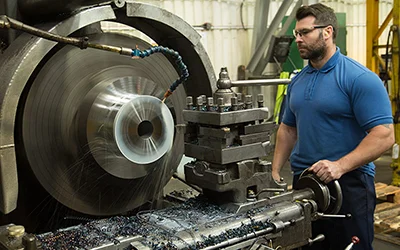After a string of false starts, the restart is finally here for good
Updated: 24 February 2021
,Jonathan Andrew
The pandemic created huge uncertainty for UK’s SMEs, which compounded an already unpredictable business environment in 2020 as the final Brexit deadline approached.
SMEs faced disrupted supply chains, closing retail outlets, seismic changes to consumer behaviours and regular amendments to government advice and support. However, with a new year has come a real reason for SMEs across the country to feel optimistic for the next 12 months. More importantly, it has brought some certainty, unlocking their ability to turn this fresh optimism into action.
This, however, does not mean that the road ahead will be an easy one. There are still challenges to overcome, and some important milestones in the coming months that SMEs should be aware of.
Changing national priorities
With the Budget now less than a week away, the Chancellor has an opportunity to act to empower the nation’s SMEs. Research from the Federation of Small Businesses (FSB) released this week found that one million small firms across the UK are being left out of current support measures, including those in supply chains that have been disrupted by rents and rising business rates.
The focus for the Chancellor should now be on measures that allow SMEs to take control of their futures, plan for the long-term and focus on growth. Measures introduced at the start of the pandemic were absolutely necessary to support the economy, but were only ever intended as short-term measure.
Taking the Bounce Back Loan Scheme (BBLS) as an example, the six to ten-year loan terms mean that SMEs will need to factor repayments into their business planning for some time yet and, with repayments due to start over the coming months, the Bank of England has already warned that £22bn of the £45bn lent may be at risk of default. While lockdown measures are due to begin easing as part of the Government’s staged approach, the imminent need to start repaying these loans is going to create yet another challenge for SMEs. It is here that the private sector can and should be playing a greater role. Alternative finance options, such as invoice finance, which unlock value from within a business without the need for additional long-term debt, will be a vital part of a more sustainable recovery.
Alongside BBLS, there are rumours that a ‘CBILS 2.0’ (Coronavirus Business Interruption Loan Scheme) may be on the horizon. With the current scheme due to come to a close at the end of March, it may feel natural that it needs to be replaced. However, as with the BBLS, CBILS creates the need for additional debt, and a long-term drag on revenues.
And, while these two much-needed schemes went a long way to support SMEs in their time of need, there remained a huge number of businesses that were unable to access either.
These loan structures were designed quickly, to help as broad a range of businesses as possible. Nationally, UK lenders have issued 229 BBLS and 10 CBILS facilities for every thousand businesses. But there are other levers within the Chancellor’s reach that offer SMEs a far better chance to drive an economic recovery.
A roadmap for recovery
The other crucial government announcement was the Prime Minister’s roadmap out of lockdown.
With the vaccine rollout now having a measurable impact, the PM set out four stages that the nation will move through in the coming months as restrictions are gradually eased. Johnson was his usual mix of cautious optimism, but even under his best-case predictions most businesses will not be able to open until 12 April at the earliest, and many won’t be operational until 21 June.
SMEs now need to do what they do best and adapt to the changes that we know are coming. I believe there are two key areas that businesses need to be thinking about now as they plan their own roadmaps to recovery: recruitment and supply chains.
When it comes to staffing, we know that thousands of businesses across the UK have had to make redundancies in the last year (at least one in 10 according to our research) and, now with a return to more normal operations possible, serious questions have to be asked about when to ramp up recruitment. Timing will be key. The furlough scheme is (currently) set to end by 1 May but ensuring that businesses are ready to hit the ground running means that recruitment can’t be left until the day lockdown restrictions lift.
Competition and capital will also be crucial here. With a host of businesses opening their doors, the jobs market is likely to pick-up and competing to find and attract the right talent is going to take time. It will also require working capital. A balancing act will need to be struck, which will differ for each business.
Secondly, supply chains. Every business in the UK is indirectly feeling the ongoing pressures caused by Brexit and the pandemic. Even those businesses not directly impacted by the pandemic are likely to have experienced changes within their supply chains and customer bases.
Ahead of the economy reopening, factories need to ramp up production, distribution networks need restarting, and shelves need to be restocked. All of this activity will need to happen quickly, as businesses wake up from months of hibernation, but this raises questions about how cash flow can be managed effectively across so many moving parts.
Such challenges are further compounded by delays at the EU border. Even businesses that do not rely on import/export will be affected by their economic relationships with those that do. For any SMEs that do rely on trade with the continent, the risks and challenges simply increase.
SME owners are often natural networkers, and now is the time to leverage these ecosystems to future proof their businesses and grow again. Responding to new customer demand, expanding trade routes to new markets, finding new ways to distribute products, all of these activities can be planned for now.
Supporting the recovery
This year holds the potential to be one of incredible growth and recovery. Yes, there are still challenges to overcome, and yes there is still uncertainty, but across the country thousands of SMEs have shown that they are capable of adapting to change and overcoming challenge.
The change that is coming is exciting, it will hopefully see markets unlock and a return to a more normal way of working and living. For SMEs, now is the time to be planning, to be looking for the right partners to help you achieve your long-term ambitions, and thriving in a transformed economic landscape.

